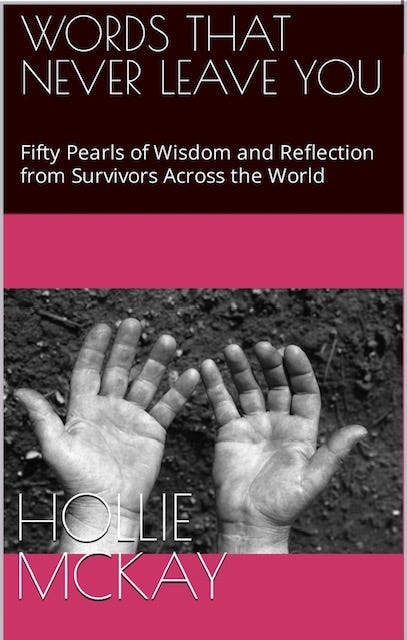Words that Never Leave You: "What kept me going through all those years in the refugee camp was going to school and church. But it was more than that..."
Part Eighteen in an ongoing series from Hollie's book "Words That Never Leave You: Fifty Pearls of Wisdom and Reflection from Survivors Across the World."
Rebecca Deng was born into a world at war. Her heavily pregnant mother, forced to run while in labor as their Sudanese village came under onslaught, reached the closest hospital. But with few medical resources and a clinic overwhelmed by the wounded, she died due to complications in childbirth.
Deng’s grandmother, who raised her after her mother’s death, also lost her life. “She died either of starvation or heartbreak,” Rebecca said. “But I think it was heartbreak.”
For some eight years, from 1992 onward, Rebecca lived in the Kakuma Refugee Camp’s dusty confines in northern Kenya, which remains one of the continent’s largest displacement camps today. Yet growing up in a country cracked with bloodletting and barbarity wasn’t the only agony Deng endured as a small girl.
At just fifteen, Rebecca was one of 89 “Lost Girls” – compared to the 3,700 “Lost Boys” – selected to come to the U.S. as an orphaned refugee in the year 2000. Just days before she boarded her flight to the U.S. as part of the “Lost Girls” program, Rebecca was raped in the refugee camp. After being taken in by a foster family in Michigan and still something of a child herself, she soon learned she was pregnant from the assault. Still, she strove forward, finishing school and earning undergraduate and postgraduate degrees, held up by the graciousness of her new home and family.
Always a dedicated student, Rebecca credits the sliver of access she had to education in the camp as a key driver, along with her faith, to surviving and thriving as a young mother balancing books with her parenting duties.
“What kept me going through all those years in the refugee camp was going to school and church. But it was more than that – it was less about the preaching and more about the friendships we formed at church,” Rebecca said whimsically. “It was about singing and dancing with my friends. It was a community that was there for each other. It was knowing that together we were all going through – and healing from – traumatic events, and yet we did not have to say a word.”
Rebecca’s reflections reinforced to me the remedial qualities of faith, believing in something beyond ourselves, and the importance of community. Life takes a village, a village of those who accept and understand us. We cannot wade through life alone.
PURCHASE YOUR COPY OF “WORDS THAT NEVER LEAVE YOU” TO READ MORE REFLECTIONS AND ANECDOTES
** Short read of meaningful lessons gleaned from the ordinary forced to become extraordinary
For speaking queries please contact meta@metaspeakers.org
I am also available for a select number of private coaching sessions for those wishing to write a book or venture into the foreign journalism space. Please contact directly for rates hollie@holliemckay.com
PLEASE CONSIDER A PAID SUBSCRIPTION TO THIS SUBSTACK TO KEEP INDEPENDENT JOURNALISM ALIVE.





